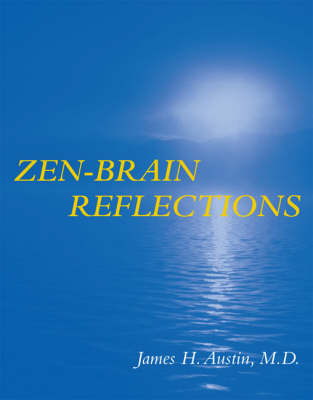
Zen-Brain Reflections
Reviewing Recent Developments in Meditation and States of Consciousness
Seiten
2006
MIT Press (Verlag)
978-0-262-01223-2 (ISBN)
MIT Press (Verlag)
978-0-262-01223-2 (ISBN)
- Titel ist leider vergriffen;
keine Neuauflage - Artikel merken
A sequel to the popular Zen and the Brain further explores pivotal points of intersection in Zen Buddhism, neuroscience, and consciousness, arriving at a new synthesis of information from both neuroscience research and Zen studies.
This sequel to the widely read Zen and the Brain continues James Austin's explorations into the key interrelationships between Zen Buddhism and brain research. In Zen-Brain Reflections, Austin, a clinical neurologist, researcher, and Zen practitioner, examines the evolving psychological processes and brain changes associated with the path of long-range meditative training. Austin draws not only on the latest neuroscience research and new neuroimaging studies but also on Zen literature and his personal experience with alternate states of consciousness. Zen-Brain Reflections takes up where the earlier book left off. It addresses such questions as: how do placebos and acupuncture change the brain? Can neuroimaging studies localize the sites where our notions of self arise? How can the latest brain imaging methods monitor meditators more effectively? How do long years of meditative training plus brief enlightened states produce pivotal transformations in the physiology of the brain? In many chapters testable hypotheses suggest ways to correlate normal brain functions and meditative training with the phenomena of extraordinary states of consciousness.
After briefly introducing the topic of Zen and describing recent research into meditation, Austin reviews the latest studies on the amygdala, frontotemporal interactions, and paralimbic extensions of the limbic system. He then explores different states of consciousness, both the early superficial absorptions and the later, major "peak experiences." This discussion begins with the states called kensho and satori and includes a fresh analysis of their several different expressions of "oneness." He points beyond the still more advanced states toward that rare ongoing stage of enlightenment that is manifest as "sage wisdom." Finally, with reference to a delayed "moonlight" phase of kensho, Austin envisions novel links between migraines and metaphors, moonlight and mysticism. The Zen perspective on the self and consciousness is an ancient one. Readers will discover how relevant Zen is to the neurosciences, and how each field can illuminate the other.
This sequel to the widely read Zen and the Brain continues James Austin's explorations into the key interrelationships between Zen Buddhism and brain research. In Zen-Brain Reflections, Austin, a clinical neurologist, researcher, and Zen practitioner, examines the evolving psychological processes and brain changes associated with the path of long-range meditative training. Austin draws not only on the latest neuroscience research and new neuroimaging studies but also on Zen literature and his personal experience with alternate states of consciousness. Zen-Brain Reflections takes up where the earlier book left off. It addresses such questions as: how do placebos and acupuncture change the brain? Can neuroimaging studies localize the sites where our notions of self arise? How can the latest brain imaging methods monitor meditators more effectively? How do long years of meditative training plus brief enlightened states produce pivotal transformations in the physiology of the brain? In many chapters testable hypotheses suggest ways to correlate normal brain functions and meditative training with the phenomena of extraordinary states of consciousness.
After briefly introducing the topic of Zen and describing recent research into meditation, Austin reviews the latest studies on the amygdala, frontotemporal interactions, and paralimbic extensions of the limbic system. He then explores different states of consciousness, both the early superficial absorptions and the later, major "peak experiences." This discussion begins with the states called kensho and satori and includes a fresh analysis of their several different expressions of "oneness." He points beyond the still more advanced states toward that rare ongoing stage of enlightenment that is manifest as "sage wisdom." Finally, with reference to a delayed "moonlight" phase of kensho, Austin envisions novel links between migraines and metaphors, moonlight and mysticism. The Zen perspective on the self and consciousness is an ancient one. Readers will discover how relevant Zen is to the neurosciences, and how each field can illuminate the other.
James H. Austin, a clinical neurologist, researcher, and Zen practitioner for more than three decades, is Professor Emeritus of Neurology at the University of Colorado Health Sciences Center and Courtesy Professor of Neurology at the University of Florida College of Medicine. He is the author of Zen and the Brain, Chase, Chance, and Creativity, Zen-Brain Reflections, Selfless Insight, Meditating Selflessly, and Zen-Brain Horizons, all published by the MIT Press.
| Erscheint lt. Verlag | 17.3.2006 |
|---|---|
| Zusatzinfo | 11 illus. |
| Verlagsort | Cambridge, Mass. |
| Sprache | englisch |
| Maße | 178 x 229 mm |
| Gewicht | 1157 g |
| Themenwelt | Geisteswissenschaften ► Psychologie ► Allgemeine Psychologie |
| Geisteswissenschaften ► Psychologie ► Biopsychologie / Neurowissenschaften | |
| Geisteswissenschaften ► Psychologie ► Verhaltenstherapie | |
| Geisteswissenschaften ► Religion / Theologie ► Buddhismus | |
| Medizin / Pharmazie ► Medizinische Fachgebiete ► Neurologie | |
| ISBN-10 | 0-262-01223-5 / 0262012235 |
| ISBN-13 | 978-0-262-01223-2 / 9780262012232 |
| Zustand | Neuware |
| Haben Sie eine Frage zum Produkt? |
Mehr entdecken
aus dem Bereich
aus dem Bereich
Buch | Softcover (2024)
Hogrefe Verlag
CHF 46,50
wie Affekte innere Entwicklung ermöglichen
Buch | Softcover (2023)
Klett-Cotta (Verlag)
CHF 41,95


